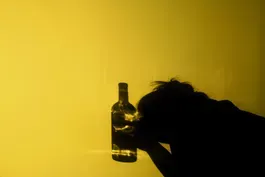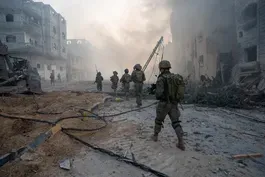
'Madness' details racism of Crownsville mental hospital
Clip: 1/24/2024 | 7m 34sVideo has Closed Captions
New book 'Madness' documents the racism of a Jim Crow-era mental health facility
Crownsville Hospital in Maryland was one of the last segregated mental asylums in the country. Thousands of Black patients came through the overcrowded, understaffed hospital and many died there. NBC News correspondent Antonia Hylton began looking into the facility a decade ago and wrote the book, "Madness: Race and Insanity in a Jim Crow Asylum.” She joined Amna Nawaz to discuss Crownsville.
Problems with Closed Captions? Closed Captioning Feedback
Problems with Closed Captions? Closed Captioning Feedback
Major corporate funding for the PBS News Hour is provided by BDO, BNSF, Consumer Cellular, American Cruise Lines, and Raymond James. Funding for the PBS NewsHour Weekend is provided by...

'Madness' details racism of Crownsville mental hospital
Clip: 1/24/2024 | 7m 34sVideo has Closed Captions
Crownsville Hospital in Maryland was one of the last segregated mental asylums in the country. Thousands of Black patients came through the overcrowded, understaffed hospital and many died there. NBC News correspondent Antonia Hylton began looking into the facility a decade ago and wrote the book, "Madness: Race and Insanity in a Jim Crow Asylum.” She joined Amna Nawaz to discuss Crownsville.
Problems with Closed Captions? Closed Captioning Feedback
How to Watch PBS News Hour
PBS News Hour is available to stream on pbs.org and the free PBS App, available on iPhone, Apple TV, Android TV, Android smartphones, Amazon Fire TV, Amazon Fire Tablet, Roku, Samsung Smart TV, and Vizio.
Providing Support for PBS.org
Learn Moreabout PBS online sponsorshipmental asylums in the country and it# operated for some 93 years.
Thousands## of Black patients came through over# the years and many of them died there.
NBC News correspondent Antonia Hylton began# looking into the facility a decade ago during## her first year of college.
I spoke with# her recently about her findings which,## she details in a new book, "Madness:# Race and Insanity in a Jim Crow Asylum."
And I asked her why she wanted to tell this story.
ANTONIA HYLTON, Author, "Madness: Race and# Insanity in a Jim Crow Asylum": It was my year, and I On the one hand, it was an academic obsession,## a passion for the history of mental health.
I think, because I come from a very big,# tight-knit family.
I'm one of seven kids.
But the one topic that always seemed off-limits# when I was growing up was mental trauma and## mental illness.
And that's because I came from a# family with a long history of dealing with those## issues and loved ones, relatives who had spent# time in institutions not unlike Crownsville.
And so when I finally was out of my own as# a young adult, it was my moment to explore,## to try to find myself, my family,# a bit of my history reflected## somewhere.
And I stumbled across -- upon# a footnote about Crownsville Hospital.
And I didn't know then what this would become, but# I knew that I had found something really special## and really important, a key piece of Black# history, of the history of psychiatry.
But,## really, it's an American story, a story# that I think implicates all of us.
AMNA NAWAZ: Tell me about what you# uncovered, though, because you go on,## as you mentioned, a decade-long# journey uncove talking to people who work there, family members# of folks who were You basically document the story# of a chronically underfunded,## perpetually short-staffed facility surrounded# by hostile neighbors sub overt and violent racism as many other# institutions and resources for Black## people at the time.
What was the impact# of that on the people who were there?
ANTONIA HYLTON: Crownsville is this# complicated institution that comes to## reflect all of these evolving battles in our# country in its early years, And one of the things that was most# shocking to me that I found when I## first embarked on all this research# was that this is the only in the state of Maryland and quite# possibly the only hospital in the## history of the United States that forced its# own pati And this is because doctors at the time had# very particular beliefs about Black people## and their minds, their mental well-being.
Many# of them believed that emancipation was a mistake## and that Black people weren't able to handle# freedom, and that this rise in mental illness,## in emotional disturbances that they were# witnessing in the years after emancipation,## they figured, well, it must be# because they can't handle freedom.
No one seemed to pause and ask, well, what# effect might have en Americans?
And so they create these segregated# institutions from the very beginning with this## idea that Black people are different and# therefore need to be treated differently,## and that the solution, part of the therapy,# the treatment is to put them back to work.
And so these patients in 1911 are brought into a# forest, and they're not just carrying some water## or sandbags and helping some contractors out.
They# are pouring cement.
They are moving railways.
They## are building massive structures from the ground# up.
And they are working side by side through the## day and night with contractors and electricians# to build a hospital that, once it's complete,## they're going to be marched inside and# they're going to become its first patients.
And so I often share that story with people# so that they understand that th e beginning, the genesis of a story that# comes to reflect so much of how Black people## are then treated.
And the hospital's# founding, it represents that moment## after emancipation.
It comes to represent# fights over integration, civil rights,## the fight for Black people's complete and honest# representation and participation in this country.
AMNA NAWAZ: You document a number of horrific,# quite frankly, accounts, acts of violence in## Crownsville, abuse of patients, inhumanity# that really just takes your breath away,## but there's also moments of bravery and# real humanity, in particular from some of## the Black staffers at the facility who really# fight for people who aren't getting treatment.
Does any one person or any# one story stick with you?
ANTONIA HYLTON: Oh, man, there are a few.
There's this group, this clique of Bla some of the very first Black people that get# the opportunity to work at Crownsville.
For its## first several decades, it's a hospital that's all# Black patients and exclusively white employees.
Then integration comes, and, slowly,# more and more Black local community## members are able to get jobs and to treat# people who don't just look like them,## but in many cases went to school# with them, rode the bus with them,## lived down the street from them.
They notice# that many patients don't have clothes,## so they go home and they gather their own leftover# clothing, and they bring it to the hospital.
They notice that some of the male patients don't# have belts and their pants are falling down all## day and they're not able to live with dignity.
So# they go and they make their own makesh very simple acts like that for decades it# seemed no other employee had thought to do.
And so they start to transform the culture of the## hospital just because they# see those pati AMNA NAWAZ: You dug into your# own family history as part of## your reporting as well and the# reluctan to talk about a lot of the mental# health issues throug You write this: "In my family, the stories# range from regular depression to anxie to alcoholism and schizophrenia.
We were warned# about how much diabetes there was in our family## medical history.
It would have helped to know# about the number of mental breakdowns too."
How has this changed how you look at# the stigma surrounding mental health## conversations, particularly# around communities of color,## where there are fewer resources and these# are often issues we ANTONIA HYLTON: It gave me more empathy,# because there was a time when I was very## angry at some of my family members.
I had# tried to have conversations with them.
I remember being in high school and asking# my parents if I could have a therapist, because I was feeling very down at school.# And they said, no, that's not something that## Black people do.
Therapists don't treat# Black people well.
You can't trust them.
And I felt like they'd shut# me down and turned me away,## and they were old-school and they just didn't# want to hear about my life and my exper But once you reckon with this history,# when you see the way in which they were## excluded from real therapy and mental health# care treatment, or when th how harmful it at times could be, you start to# understand why maybe did my grandparents and## my parents think this system wasn't for them, that# it wasn't safe for their children to engage in it.
AMNA NAWAZ: The book is "Madness:## Race and Insanity in a Jim Crow Antonia, thank you so much.
ANTONIA HYLTON: Thank yo
Alcohol-related deaths surge in Colorado
Video has Closed Captions
Clip: 1/24/2024 | 5m 27s | Alcohol-related deaths surge in Colorado with a higher mortality rate than opioids (5m 27s)
Democratic, GOP strategists break down Biden-Trump rematch
Video has Closed Captions
Clip: 1/24/2024 | 8m 12s | Democratic and Republican strategists break down likely Biden-Trump rematch (8m 12s)
Experts discuss threat posed by Iran, fears of regional war
Video has Closed Captions
Clip: 1/24/2024 | 11m 44s | Experts weigh in on threat posed by Iran and line U.S. is walking to avoid regional war (11m 44s)
Haley sets sights on S.C. in uphill climb against Trump
Video has Closed Captions
Clip: 1/24/2024 | 5m 25s | Nikki Haley sets sights on South Carolina in uphill climb against Trump (5m 25s)
Oscar nominations spark controversy with Barbie snubs
Video has Closed Captions
Clip: 1/24/2024 | 5m 14s | Oscar nominations spark controversy with snubs of Barbie's Margot Robbie, Greta Gerwig (5m 14s)
Video shows shooting of apparently unarmed man in Gaza
Video has Closed Captions
Clip: 1/24/2024 | 4m 4s | Video shows apparently unarmed Palestinian with hands up shot dead in Gaza (4m 4s)
Providing Support for PBS.org
Learn Moreabout PBS online sponsorshipSupport for PBS provided by:
Major corporate funding for the PBS News Hour is provided by BDO, BNSF, Consumer Cellular, American Cruise Lines, and Raymond James. Funding for the PBS NewsHour Weekend is provided by...

















